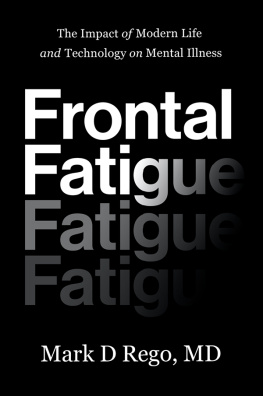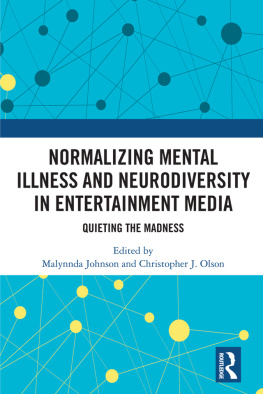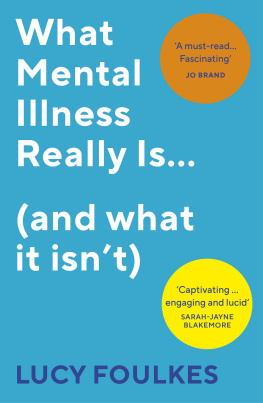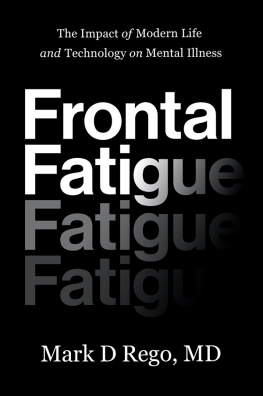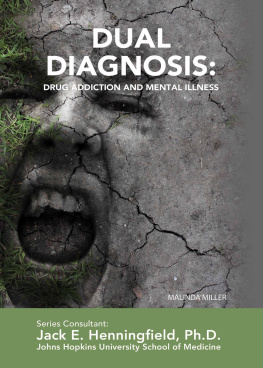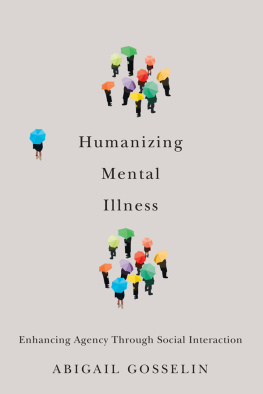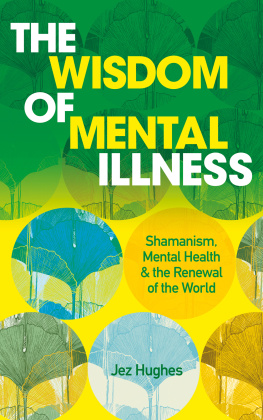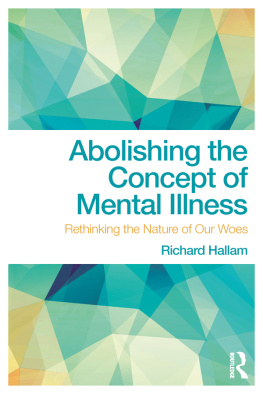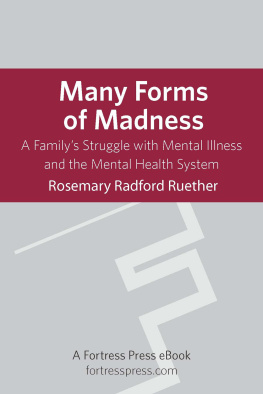Praise for
Frontal Fatigue
With deft writing and the sensibility of a natural teacher, Dr. Mark Rego has written a book that accomplishes many things. He provides an overview of psychological health and mental illness in plain language. He translates philosophical and social theory of our time into a commonsense, transparent account of why mental illness is on the increase. He provides the scientific background for his hypothesis of frontal fatigue, all in easy-to-understand language. He defends the frontal fatigue hypothesis with cutting-edge scientific findings and describes how we might respond and adapt. In this short book he provides a provocative analysis of how our runaway technoculture is draining brains still better-suited to the Stone Age.
John Z. Sadler, MD, The Daniel W. Foster, MD Professor of Medical Ethics, Distinguished Teaching Professor, Professor of Psychiatry & Population/Data Sciences, UT Southwestern
As a student of human nature, Regos assessment rings true. Readable, accessible, balanced and insightful, honest and reasoned, Regos work speaks to mind, heart, and soul. Read it and find there is hope for you amid the crazy world we are in.
The Rev. Andrew G. Osmun, Episcopal Priest and Spiritual Director, member of the Fellowship of St. John (SSJE), a Trustee of the Society of Anglican Missionaries and Senders, and active in criminal justice reform and advocacy with the Restorative Action Alliance
In this groundbreaking work, Dr. Rego offers a radically new understanding of why stress and mental illness are increasing even as technology seems to ease our lives. He shows how the complex, abstract, and endlessly shifting demands of modern life overwhelm the prefrontal cortex, the part of our brain that is uniquely human but uniquely vulnerable. He closes with new insights for finding sanity and tranquility in the cacophony of the new human experience.
Paul Desan, MD, PhD, Associate Professor, Director, Psychiatric Consultation Service, Department of Psychiatry, Yale School of Medicine
Mark Rego has figured out something that has been in front of the noses of mental health specialists for decades. Its this: the stampede of new information that humans must process every day is wearing down the brains capacity to function correctly. Through painstaking research, interviews with international experts, and reflections on the many patients who have crossed his path, Dr. Rego easily and clearly takes his reader on a guided tour of major psychiatric conditions, the social foundations of wellness, and the intricacies of brain physiology. Frontal Fatigue is a master class in psychiatry with an eye-opening conclusion that will make everyone who reads it rethink the role that technology plays in our lives.
Scott Haltzman, MD, Distinguished Fellow, American Psychiatric Association, Medical Director, Fuller Hospital, South Attleboro, MA, Author, The Secrets of Happily Married Men, The Secrets of Happy Families, Eight Keys to Building a Lifetime of Connection and Contentment, The Secrets of Happily Married Women, and The Secrets of Surviving Infidelity
This book is intended as a reference volume only. It is sold with the understanding that the publisher and author are not engaged in rendering any professional services. The information given here is designed to help you make informed decisions. If you suspect that you have a problem that might require professional treatment or advice, you should seek competent help.
Published by River Grove Books
Austin, TX
www.rivergrovebooks.com
Copyright 2021 Mark D Rego
All rights reserved.
Thank you for purchasing an authorized edition of this book and for complying with copyright law. No part of this book may be reproduced, stored in a retrieval system, or transmitted by any means, electronic, mechanical, photocopying, recording, or otherwise, without written permission from the copyright holder.
Distributed by River Grove Books
Design and composition by Greenleaf Book Group
Cover design by Greenleaf Book Group
Interior Images: Brain CT Scan; Health medical image of an MRI / MRA (Magnetic Resonance Angiogram) of the head showing the brain; an array of positron emission tomography or PET images showing many phases of brain perfusion function and activity; used under license from Shutterstock.com. Graph on page 127 republished with permission of Elsevier Science & Technology Journals, from Physician Distress and Burnout: The Neurobiological Perspective by Amy F. T. Arnsten PhD, Vol 96 Issue 3, pp. 763-769, March 1, 2021; permission conveyed through Copyright Clearance Center, Inc. Human brain in the body with highlighted frontal gyri
Publishers Cataloging-in-Publication data is available.
Print ISBN: 978-1-63299-434-9
eBook ISBN: 978-1-63299-435-6
First Edition
My wonderful wife, Sherra, who not only creates our home and cares for my health, but also makes for a floor beneath my feet and a sun that lights my days. Words could not thank her enough, so I offer all my love.
And I must mention Justin Blasberg, MD, whose surgical genius and indefatigable tenacity saved my life.
Contents
A Note on Terminology
In this book, I avoid the terms mental health problems, emotional problems, or just plain issues when discussing psychiatric disorders, as they can be overly vague or, worse, they are euphemisms that contribute to the taboo nature of mental illness. Instead, I use the term mental disorder when discussing a specific illness and mental illness when discussing the general field of psychiatric illnesses as a whole. I describe life problems that are not a psychiatric disorder as mental health problems or simply life issues. For illnesses that are not mental disorders, I use the term medical illness.
There are several terms used throughout this book that may be familiar, but where a specific definition or explanation may be helpful:
Psychosisa severe form of mental illness in which a person has either hallucinations, delusions, or both.
Psychiatric pathologythe symptoms and diseases of mental illness.
Birth cohorta group of people born around the same time.
Attention deficit hyperactivity disorder (ADHD)a mental disorder that affects a persons ability to direct their attention as they wish, their organization abilities, and their impulse control. Not all sufferers of this disorder have the hyperactive tendencies associated with this disease, and so many choose to use the term ADD, leaving out the H. In this book, Ive used ADHD since that is the official name of the disorder.
Helpful resources for understanding other terms used in psychiatry are NAMI (The National Alliance on Mental Illness, http://www.nami.org) and the American Psychiatric Associations online resource for patients and families (https://www.psychiatry.org).
Acknowledgments
I t takes a lot of people to support a life. A book is a miniature reflection of this same process. Ill begin thanking these many people in my professional life. James Phillips, MD, has been a friend, colleague, and mentor since I thought about opening my practice. In addition, he has patiently helped me learn about philosophy for the past twenty-five years. I could not have done all of this without him. We also partnered in our project in Peru, which is one of the high points of my life.
In addition, Lois Longwell, LCSW, Eve Harrison, LCSW, Henr Czarny, MD, Paul Desan, MD, Wendy Stewart, PhD, and Peter Talbot, LCSW, MS, continue to be great friends and colleagues, who also were of constant support through my long illnesses. Lastly, I must mention my patients, who put their well-being into my hands. Your openness and courage taught me more about life than I learned anywhere else. I am sorry I had to leave you all.

